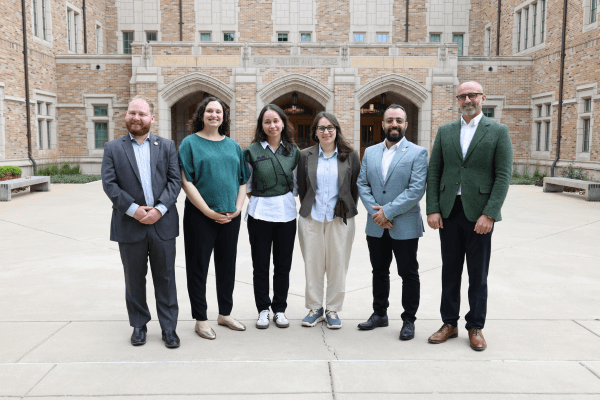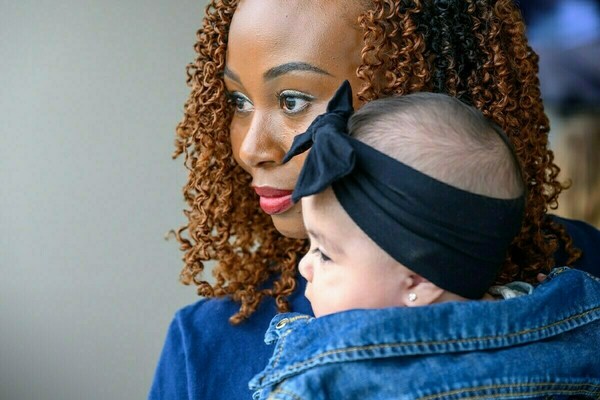Kroc Institute welcomes six new Ph.D. students, names fellowship recipients
The fall 2025 semester saw the arrival of six new doctoral students at the Kroc Institute for International Peace Studies, part of the Keough School of Global Affairs. Four of the incoming students make up the first cohort of the newly launched international peace studies doctoral program, with the remaining two students joining long-running and highly regarded joint doctoral programs administered by the Kroc Institute.
The newest students were selected from a highly competitive pool of applicants from around the world, bringing the total number of doctoral students at the Kroc Institute for the 2025-26 academic year to 31.
“We’ve been thrilled at the interest in the new international peace studies program,” said Cat Bolten, a professor of anthropology and peace studies and the director of doctoral studies at the Kroc Institute, “and are delighted to have welcomed a large cohort this fall for the program’s launch.”
This new Ph.D. program is designed for individuals with professional experience in peace-related fields who wish to integrate their professional backgrounds and interdisciplinary knowledge into their doctoral research. It joins six other long-standing joint doctoral programs administered by the Kroc Institute in partnership with the University of Notre Dame’s College of Arts and Letters, in distinct disciplines: peace studies paired with anthropology, history, political science, psychology, sociology, and theology.
This year’s incoming doctoral students are:
Eskandar Ataallah (international peace studies) is a Syrian peacebuilding practitioner and researcher with experience across conflict-affected settings in relief, development, and peacebuilding. His work spans program management, context analysis, and stakeholder engagement with organizations such as the United States Agency for International Development, United Nations Development Programme, United Nations High Commissioner for Refugees, and Catholic Relief Services. Before beginning his doctoral studies, Ataallah earned a Master of Global Affairs in International Peace Studies at the Keough School of Global Affairs and a Bachelor’s degree in Economics from Tishreen University. His academic interests center on the intersections of artificial intelligence and peacebuilding, exploring how emerging technologies can be harnessed to prevent conflict, strengthen social cohesion, and support inclusive peace processes.
Melissa Baganz (international peace studies) is committed to understanding the prevalence of violence despite formal peace processes and to exploring how the structure and design of such processes may contribute to ongoing violence. As a certified civil mediator and experienced workshop facilitator, she has spent years mediating disputes and delivering trainings in mediation, conflict transformation, and communication skills, with practical, hands-on expertise from her work with nongovernmental organizations in Germany and India. Baganz holds a Master of Arts in Intercultural Conflict Management from the Alice Salomon University of Applied Sciences in Berlin, where she was awarded a scholarship by the "Studienstiftung des deutschen Volkes" (German Academic Scholarship Foundation). She also holds a Bachelor of Arts in Area Studies with a focus on South Asia from Humboldt University in Berlin.
Sarah DeMarais (peace studies and theology) is a Catholic theologian and interdisciplinary scholar committed to promoting social healing in communities recovering from violence and trauma. DeMarais holds a Bachelor of Arts in Theology and Peace Studies, Master of Education, and Master of Theological Studies from the University of Notre Dame. Her M.Ed. was earned as an Alliance for Catholic Education Teaching Fellow. She also holds a Master of Science in Clinical Mental Health Counseling from Loyola University New Orleans. DeMarais served violence-exposed youth in post-Katrina New Orleans as a mental health counselor, teacher, and nonprofit administrator. She then managed theological education projects for Catholic religious sisters in Eastern and Southern Africa who studied and applied Catholic social teaching in projects advancing integral human development. In South Bend, she has contributed to Todd Whitmore's “Sophia's Feast” research project by co-facilitating addiction recovery groups for women. DeMarais is a Notre Dame Presidential Fellow.
Mohamed El Meadawy (international peace studies), is a peace researcher and practitioner whose work examines the intersection between peacebuilding, development, and religious ethics, with a particular emphasis on post-conflict societies. A classically trained Islamic scholar, he earned his Bachelor of Arts in Peace and Conflict Studies from Malmö University and his Master of Arts in Peace and Conflict Research from Uppsala University.
Shimon Likhtman (peace studies and anthropology) received his Bachelor of Arts in Social Relations and Policy from Michigan State University and holds an Master of Arts in Southeast Asian Studies from the University of Michigan. His master's thesis, "Where do We Go from Here? Past, Present, Future, and Uncertainty during Rupture on the Tonlé Sap Lake, Cambodia" examined varied reactions from individuals, the state, minority communities, and local stakeholders to the collapse of a unique local environment on Cambodia's Tonlé Sap Lake, with a focus on highlighting the uncertainty inherent in the era of climate change and the multiple possible futures contained within a transitional period.
Aidana Rakhatbekova (international peace studies) is interested in advancing environmental justice in indigenous communities, focusing on how colonial legacies and state environmental policies impact indigenous territories, livelihoods, and traditional ecological knowledge. Her research explores how indigenous communities resist these pressures and mobilize for justice in the face of environmental change, governance challenges, and structural inequalities in North Asia. Since 2016, Rakhatbekova has worked with international and local organizations on human rights, legal cooperation, and cross-cultural dialogue, including positions at the Red Crescent Society of Kyrgyzstan and the Foundation for International Legal Cooperation. Her academic and professional experiences across Central Asia, Turkey, and Germany have shaped her transnational outlook and commitment to working across diverse cultural and political contexts. She earned a master’s degree in Peace and Conflict Studies from Otto-von-Guericke University in Germany as a DAAD scholar and a bachelor’s degree in Sociology from Middle East Technical University in Turkey as a Türkiye Bursları scholar.
Read full bios of all peace studies doctoral students here.
In addition to welcoming new students, four current Ph.D. students have been awarded fellowships funded by the Kroc Institute Advisory Board members for the 2025-26 academic year:
Cody Jackson (peace studies and sociology), a third-year student, and Geleta Berisso (peace studies and theology), a second-year student, have been named this year’s Mullen Family Fellows. The Mullen Family Fellowships were created in 2008 thanks to the generosity of the family of Jack Mullen (B.S. ‘53), chair of the Kroc Institute’s Advisory Council from 2003-2016. His daughter, Paddy Mullen (B.A. ‘80), serves as the current chair of the Kroc Institute Advisory Board.
Elsa Barron (peace studies and political science), a second-year student, has been named this year’s Steven D. Pepe Ph.D. Fellow in Peace Studies. The Pepe Fellowship is the result of a generous gift from The Honorable Steven D. Pepe (B.A. ‘65), a retired U.S. Magistrate Judge (Michigan) and member of the Kroc Institute’s Advisory Board. Pepe’s gift provides ongoing support for doctoral students in peace studies who have distinguished themselves in research, teaching, or service.
And finally, Nipunika Lecamwasam (peace studies and anthropology), a second-year student, is this year’s Darby Fellow. The Darby Fellowship was established in 2010 in memory of John Darby, professor of comparative ethnic studies at Notre Dame from 1999 until his death in 2012. The award is given annually to students who exemplify his commitment to rigorous, normatively-informed scholarship on peacebuilding and conflict resolution.
Applications for the 2026-27 academic year are due Dec. 1, 2025. For more information, contact Kathryn Sawyer Vidrine at krocphd@nd.edu, and to learn more about the doctoral programs overall, visit here.
Originally published by at kroc.nd.edu on September 25, 2025.
Latest Research
- Fighting for maternal healthThe United States has the highest maternal mortality rate of developed nations. An innovative postpartum care model from Notre Dame can save mothers around the globe. Read the story Originally…
- NSF Cyber SMART’s fall meeting shapes fifth year of project, legacy and future plans, and adds new memberThe U.S. National Science Foundation (NSF) Cyber SMART center gathered for its fall meeting on the University of Notre Dame campus this September. The meeting served as a checkpoint with progress reports and new projects from research leads and students…
- Slavic and Eurasian studies professor wins Humboldt fellowship to research how Russia’s religious past shapes its presentWhen Russia invaded Ukraine on Feb. 24, 2022, Sean Griffin realized his second book needed a new title. Griffin, an associate professor in the University of Notre Dame’s Department of…
- Notre Dame’s R.I.S.E. AI Conference builds interdisciplinary collaboration to inform human-centered artificial intelligenceAs artificial intelligence (AI) transforms nearly every sector of society — from healthcare and education to governance and global development — a critical question emerges: How can we conscientiously design and deploy these powerful technologies to positively impact society? This…
- University of Notre Dame joins the Global Coalition of Ukrainian StudiesThe University of Notre Dame has joined the Global Coalition of Ukrainian Studies after signing a Memorandum of Cooperation (MOC), formalized on September 24, 2025, at the Ukrainian Institute of America in New York City. Notre Dame joined four other American…
- The University of Notre Dame’s Mendoza College of Business and Industry Labs team up to inspire national security manufacturing competitiveness in the regionThe South Bend - Elkhart Region is full of manufacturing companies that are poised to grow, and Executive Master of Business Administration (EMBA) and Master of Business Administration (MBA) students at the University of Notre Dame are finding innovative ways to contribute to that growth. Earlier…













